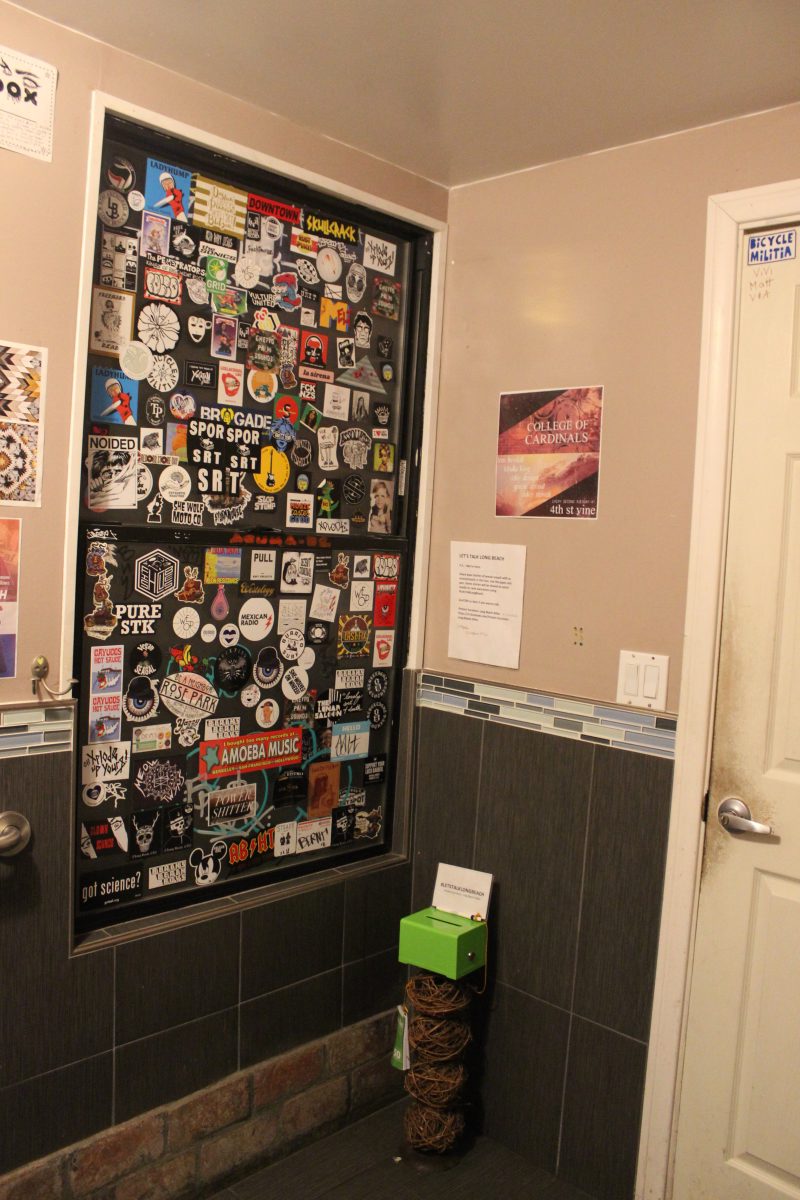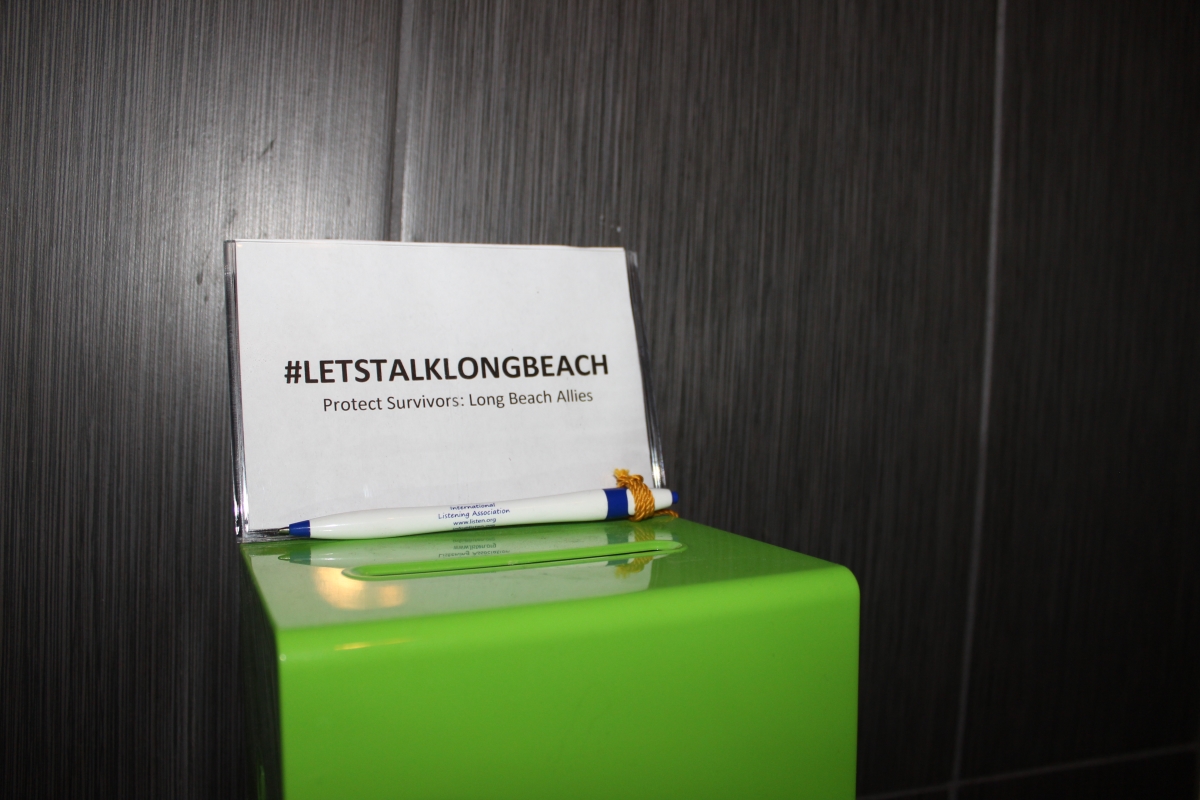Art Installation Aims to Open Dialogue About Sexual Assault
5 minute readWARNING: This article contains multiple stories describing sexual assault.
A local organization has created a touring art project that invites those who have experienced sexual assault to handwrite and anonymously share their stories, later to be shared on social media.
For about two weeks, a locked green box equipped with a pen, notepad, and a small opening on top was installed in the 4th Street Vine bathroom and is now in one of the bathrooms at Fox Coffee House (both spots have gender-neutral facilities). It will remain there until Sunday, before being moved to another venue.
The public art project, called #LetsTalkLongBeach, was created by Protect Survivors: Long Beach Allies, a new community organization that aims to open a city-wide conversation around sexual assault and provide support for survivors.
“I think a lot of survivors feel afraid to share their accounts or they feel ostracized or they don’t know how to talk about it publicly,” said Sarah Bedy, a spokesperson for PSLBA. “We thought we really had to start with a comfortable awareness campaign that would engage people in a way that they were still safe, and to put it out there that this is a pretty common occurrence.”
PSLBA—which includes members who themselves are survivors of sexual assault—began sharing the stories one-by-one two weeks ago via social media.
“It was 13 years ago. I was 19,” begins one of the stories they’ve received. “I was raped at party by a ‘cool guy’ in the punk scene. It was a Saturday night party. Went to school on Monday, heard everyone was calling me a slut. This is college, I thought people didn’t talk like this. I still love punk but I’m afraid of punks. I never reported because people said I wanted it.”
PSLBA is cognizant of the project’s drop sites, and is focusing on installing the box in places where the city’s art and music community gather.
Jim Ritson, co-owner of 4th Street Vine, was happy to host the project, and said that “every conversation about this topic is a good conversation. It’ll help people think. People are telling their stories in real time.”

#LetsTalkLongBeach in the 4th Street Vine bathroom | Photo by Madison D’Ornellas
Last month, PSLBA took part in rebuking accused rapist and DJ the Gaslamp Killer, who had been scheduled to play a Long Beach date during his Airplane Mode mini-tour. After community pressure, the show was cancelled at Qué Sera, and after a last-minute venue change to Ashley’s on Fourth, the show was again cancelled after members of PSLBA threatened to protest outside the venue.
Of the three cities with scheduled shows, Long Beach was the only one where a performance was cancelled.
“There’s this existing idea that artists are more progressive members of society; people who are above such actions,” said Keayva Mitchell, a poet and member of PSLBA. “But there is a long history of sexual misconduct in artistic communities that is only just now starting to be addressed; only just now starting to be addressed within ours.”
The organization noted that the project should not be taken as a substitute for reporting crimes to the police—if that is what a victim wishes to do. Bedy says that the organization has not yet formed a policy on what the organization will do if they receive the name of alleged perpetrator.
Tomisin Oluwole
Ode to Pink II, 2020
Acrylic and marker on paper
14 x 22 inches
Click here to check out our interview with Tomisin Oluwole, a a literary and visual artist based in Long Beach.

Instead of gunking up our site with ads, we use this space to display and promote the work of local artists.
Gino Martinez, who joined the organization recently, says that the conversation surrounding sexual assault should include everyone.
“…I realized that it’s important for men to have a voice and [say,] ‘Hey, this is wrong.’ It’s very important for men to be a part of this group. There’s a lot of work that needs to be done, I can really feel it and see it,” Martinez said.
In another of the stories PSLBA received, a family member recounts the aftermath of a loved one’s sexual assault and how race could have played a role in the accuser getting away scot-free: “There were witnesses to my sisters (sic) rape and a 911 call by his son. She’s Puerto Rican. He’s white. The prosecutor couldn’t get a conviction.”
PSLBA said about 12 stories were deposited in the box in it’s two-week stint at 4th Street Vine, and said they received only one critical note from a self-identified 37-year-old woman who wrote that the #MeToo movement “is becoming too much of a trend” and that men should be allowed to “flirt w/o being afraid!”
The group said they also received two thank you notes.
“I want the box to be a sort of safe haven for survivors to speak their truths in these art venues and spaces where they probably haven’t ever been able to before,” said Mitchell. “I want them to know we see them and that we’re here.”
In the last year, there were 172 reported rapes in the city, up slightly from the 168 reported in the previous year, according to Long Beach Police Department crime statistics. However, only about 23 percent of rapes or sexual assaults are reported to police, the U.S. Justice Department’s 2016 Criminal Victimization Survey found.
“I think that [PSLBA] are going to be surprised by how much feedback [they] get,” said Cynthia Kanigowski, a special education kindergarten teacher and patron at 4th Street Vine on one of the days was box was there.
Like another art installation with a similar mission—The Clothesline Project at Cal State Long Beach—PSLBA hopes that #LetsTalkLongBeach can be a visual reminder of the lifelong consequences of sexual assault.
Going forward, PSLBA hopes to keep moving the #LetsTalkLongBeach to different venues around the city to raise awareness of the issue while creating a support network for other survivors.
“There needs to be more people talking about [sexual assault] and people making sure it doesn’t happen [again],” said Paul Gonzalez, a bartender at 4th Street Vine. “Those boxes need to be everywhere.”
PSLBA will continue to share stories they receive on Facebook and Instagram. #LetsTalkLongBeach is currently in one of the bathrooms at Fox Coffee House at 437 West Willow St.


 madison@forthe.org
madison@forthe.org




